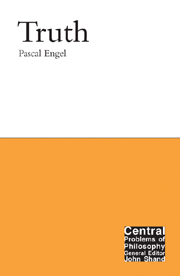Introduction: Truth lost?
Summary
Truth is a central philosophical notion, perhaps the central one. Many other important philosophical notions depend upon it or are closely tied to it: thought; belief (to believe something is to believe that it is true); knowledge (if one knows a proposition, then it is true); reality (reality is what our true statements, beliefs and theories are about); existence or being (can we talk truly about nonexistents?); fact (facts are what make our statements true); possibility and necessity (can one say something true about what is merely possible? Are there propositions which can be true in all possible worlds?); and many other kindred notions such as proposition, sentence, statement, assertion, entailment, and so on. It is also central because it seems to be what theoretical life is about, or what it aims at. Science is said to be a search for truth; perhaps this also applies to philosophy and other disciplines. Practical life, by contrast, is said to be the search for the good, or the just, and does not result in things that are true or false; but many philosophers claim that the good or the just are objects of knowledge, and in so far as knowledge involves truth, this notion is relevant in the practical realm as well. Even if ethics is not to be understood as a matter of knowledge of certain truths (but, say, as a matter of expression and regulation of feelings), it is important to understand the nature of truth in order to see the contrast.
- Type
- Chapter
- Information
- Truth , pp. 1 - 8Publisher: Acumen PublishingPrint publication year: 2002

